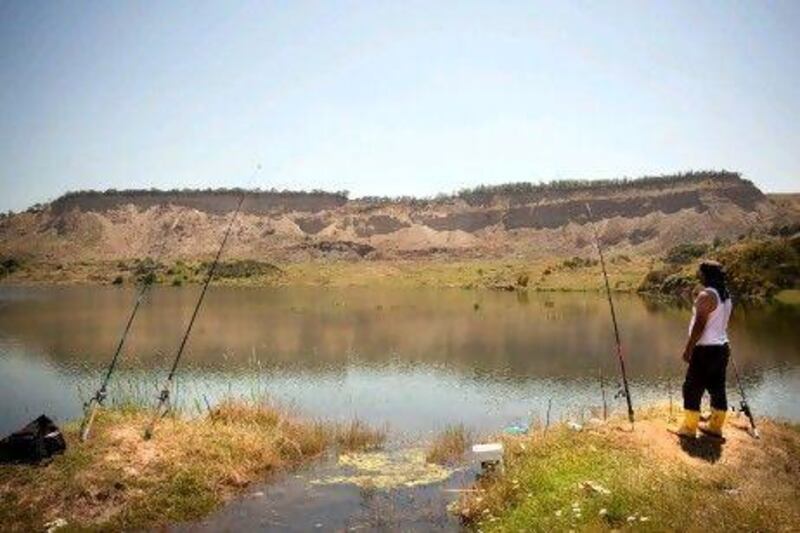AKPINAR, Turkey // A sleepy village surrounded by open-cast mines at the end of a dusty country road, Akpinar seems an unlikely place to host the world's biggest sporting event.
And yet the Olympic Games may come here in 2020, if plans by the Turkish government bear fruit.
"They will build the stadium just on the other side of the hill," said Necdet Bilgic, 63, who was sitting outside a teahouse in Akpinar with other villagers last week.
Akpinar, which has a population of about 1,000, is in an area about 40 kilometres north of Istanbul that is designated by city planners to become Yeni Sehir, or New City, a settlement for a million people to be built on 16,000 hectares near the Black Sea coast.
Currently, the area is surrounded by forest and dotted with sandpits, coal mines and the occasional village where cattle casually cross the roads and traffic mostly consists of trucks carrying material from the mines. But that may change soon.
"Akpinar will be gone," Mr Bilgic said.
The plans for Yeni Sehir include facilities to host the Olympics eight years from now, complete with sports arenas and an Olympic Village for 25,000 athletes.
Istanbul, along with Tokyo and Madrid, is a candidate to host the 2020 games and a decision by the International Olympic Committee is expected in September next year.
An airport with six runways and a capacity of at least a hundred million passengers a year - which would make it one of the busiest in the world - is also part of the project. Yeni Sehir is also to have universities, a world trade centre, harbours and a modern transport system.
The airport alone will cost about US$5 billion (Dh18bn), according to Binali Yildirim, the Turkish transport minister. No figures were available for the cost of the new settlement.
Yeni Sehir and the new airport are parts of a multibillion construction programme announced last year by Recep Tayyip Erdogan, Turkey's prime minister.
Called the "audacious project" by Mr Erdogan and the media, it also includes a new shipping canal linking the Black Sea to the Sea of Marmara. According to Mr Erdogan, the project is scheduled to be completed in time for the 100th anniversary of the Turkish republic in 2023.
Plans for the lay-out of Yeni Sehir surfaced in the Turkish press for the first time this month.
"This is quite an ambitious project," said Sidney Rasekh from the company Urban Green Global, an American city planner and architect who was hired as a consultant by Istanbul's authorities to do the planning for Yeni Sehir.
"Yes, I think they can do it," he said about the deadline facing Turkey's authorities and construction companies. "They have to work very hard. There is no slack time."
In an interview last week, Mr Rasekh, who was involved in an urban planning programme in Vancouver in the 1980s that resulted in the Canadian city being declared the most liveable city in the world by the United Nations, said Istanbul's "New City" would combine modern technology with ecological principles.
He said plans for the new settlement foresaw turning current wasteland and sandpits into a modern urban area with a car-free green strip along the Black Sea coast, "smart" buildings that create their own power, wind and bio-gas power stations, fruit and vegetable gardens, walkable neighbourhoods and a public transport system with a high-speed metro connection to the centre of Istanbul.
"It probably would be the smartest city in all of Europe," Mr Rasekh said. Work on the project will start next year, he added.
Yeni Sehir would probably be populated by airport workers, people resettled there from earthquake-prone areas of Istanbul and "people who prefer to live in a green world", Mr Rasekh said.
In the villages located in the area earmarked for Yeni Sehir and the airport, locals said last week preparations had already begun.
"They have started clearing some forest land," said Mehmet Guven, a 48-year-old truck driver in the village of Tayakadin, close to the proposed airport and about 10km to the north-west of Akpinar. Others said land surveying and geological inspections were underway.
Mr Guven said he did not like the prospect of having the world's busiest airport next to his quiet village. "Others will make money, and we will be stuck with the noise," he said.
But other villagers were more positive. "This is going to be great," said Bahattin Durukan, 80. "We will make money from the sale of our land."
Opinions were also divided in Akpinar. Ersin Kriga, 44, said the bumpy road to the village was being modernised for the first time in years, probably due to the Yeni Sehir project. "This will bring higher income and more jobs," he said.
Others were more cautious. "Our peace and quiet will be gone," said Yucel Akin, 36. "It's not good."
Akif Burak Atlar, the general secretary of the Istanbul chapter of Turkey's chamber of city planners, agreed with the critics of the project. "This is a decision that blackens Istanbul's future," he said.
According to Mr Atlar, neither Yeni Sehir nor a third motorway bridge over the Bosphorus that the government recently announced were included in a 2009 plan by Istanbul's municipality. "The north of Istanbul was to be protected as a natural resource," Mr Atlar said.
"If it goes on like this, Istanbul's natural resources will be destroyed in the next 30 to 50 years."
Mr Atlar said the authorities wanted to open up Istanbul's northern area to the construction and real estate industries and the public had been left in the dark.
Istanbul's municipality did not respond to requests for a statement.
[ tseibert@thenational.ae ]






